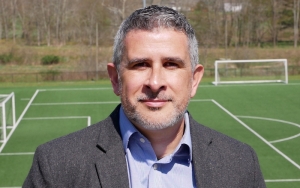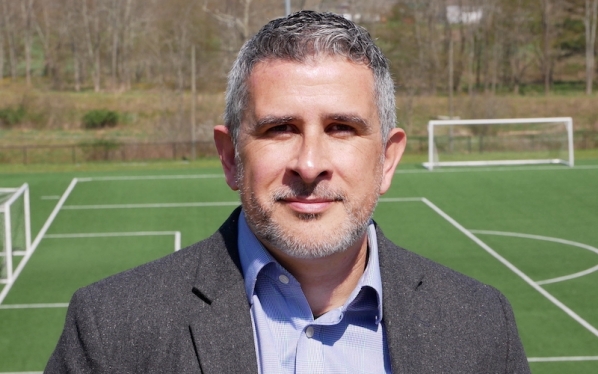Dr. Rwany Sibaja is the director of the History/Social Studies Education program at Appalachian State University, and an Associate Professor in the Department of History. His research centers on popular culture in Latin America, particularly sport and leisure. HIs current focus is on soccer and identity in mid-twentieth-century Argentina. His other research interests center on digital tools in the history and social studies classroom and the Scholarship of Teaching and Learning (SoTL).
He received a BA in History from Elon University, MA in History from The University of North Carolina at Greensboro, and Ph.D. in History from George Mason University. Prior to joining App State, Dr. Sibaja completed a postdoctoral fellowship at the University of Maryland, Baltimore County (UMBC), and as a research assistant for educational projects at the Roy Rosenzweig Center for History and New Media at George Mason.
In public education, he served as the K-12 Social Studies Program Manager at Winston-Salem/Forsyth County Schools, and as a 9-12 History and Spanish teacher at North Davidson High School and Cedar Ridge High School (Orange County Schools). Dr. Sibaja is a graduate of the original NC Teaching Fellows Program.
What excites you about History, Social Studies Education?
Most of our program majors will tell you that their decision to become secondary social studies teachers stems from their love and passion for history. Thinking back to my own college experience as a NC Teaching Fellow in History, I recognize my students' passion for teaching history. However, as a high school teacher, I realized that my responsibility went beyond teaching interesting stories or fascinating figures from the past. My job is thus to teach students through history/social studies and use the study of the past to help them make sense of the world they live in. This shift in focus requires educators to know their students. Understanding who they are, and where they come from, allows me to find ways to best help students acquire the critical thinking skills that will serve them in the future.
What do you love most about teaching this subject to Appalachian students?
At Appalachian, I have the privilege of working with future social studies educators and exposing them to a variety of instructional approaches. We discuss chronological, thematic or even hybrid approaches to designing curriculum for a history course. We also explore the potential of digital tools to transform the history classroom and analyze ways that we can globalize the curriculum. But I also value sharing my journey as the son of immigrants from Costa Rica, as a first-generation college student, and as a Latino educator in the South who taught in both Social Studies and Spanish departments (and outside of class as club advisor and soccer coach). My hope is that any of these experiences can help me better connect with students; or, at the very least, expose students to life and career experiences that are unfamiliar to them. In my courses, I encourage students to build a community by sharing their own life experiences as well. Nothing is more gratifying than seeing the process of self-discovery take place as students begin to use their personal experiences and academic journeys to generate their own philosophies of teaching.
Why does North Carolina (and beyond) need quality teachers for History/Social Studies?
Many people – including our majors at App State – blame high-stakes testing for the tendency of social studies teachers in NC to “teach to the test” and cover too much content in a given semester. But there's another reality: history educators have relied far too long on delivering long lectures. This approach may be dynamic in the hands of gifted and knowledgeable presenters, but it also creates a teacher-centered environment where students are largely passive recipients in the classroom. It’s a miracle that so many of our program majors love history despite their own experiences with long lectures, worksheets and videos.
North Carolina students deserve high-quality social studies educators, whose mission is to empower them to develop historical thinking skills and use these skills to become active citizens. Teachers should constantly ask students to analyze primary and secondary sources, as well as teach them different ways to present their findings – especially with the enormous amount of digital tools at their disposal. Our job at Appalachian is to encourage future social studies teachers to nurture this type of dynamic student-centered, digital and global learning environment. We want our majors to teach children how to do history in the twenty-first century.
Why should a student interested in this degree choose Appalachian?
Appalachian runs one of the two largest history and social studies education programs in North Carolina. Our BS in History/Social Studies Education program is also the second largest education program on campus behind K-5 elementary. Graduates from our program have a strong reputation for quality teaching in North Carolina, across the country, and even overseas.
All of these facts make Appalachian an attractive destination, but it is the strength of our entire History department that makes us unique. Students in our major can work with scholars in history education, public history, and digital humanities. Their areas of specialization cover a wide range, including Africa, Asia, Latin America, Europe and the US – including experts on Appalachian history. By using the skills and expertise of our entire History Department, our goal is to produce graduates who are confident in their knowledge of the past, skilled at teaching history, and ready to incorporate digital tools and a global focus in the classroom.

